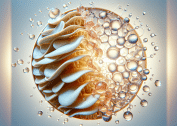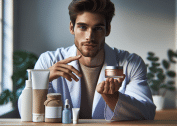Curious about collagen in your skincare routine? This guide uncovers what beauty experts, dermatologists, and scientific studies reveal about collagen supplements, topical creams, and natural ways to support radiant, youthful-looking skin. Explore facts and practical tips many people overlook to elevate your beauty wellness journey.
Understanding Collagen’s Role for Glowing Skin
When it comes to skin vitality, collagen stands out as one of the most discussed elements. This structural protein is a fundamental component of skin, hair, and nails, providing firmness and elasticity that contribute to a youthful appearance. As years pass, the body’s natural collagen production gradually declines, often leading to wrinkles and decreased skin plumpness. However, collagen skincare is not solely about preventing visible signs of aging—it’s about supporting overall skin health using evidence-backed techniques and products that work with the body rather than against it.
Some believe that simply applying a topical collagen cream or using a serum is enough to combat every wrinkle. Yet, the effectiveness of these products depends greatly on formulation and how ingredients penetrate the skin barrier. Clinical data review shows that certain peptides and smaller molecular weight collagens can be absorbed more efficiently, while larger molecules tend to remain on the surface, acting as moisturizers instead. This subtle difference means consumers might benefit more by combining strategies, such as ingesting collagen-rich foods along with using specialized skincare formulations for firmer, smoother-looking skin.
Collagen’s benefits also stretch beyond skin surface concerns. It supports the skin’s resilience against environmental damage, such as pollution and ultraviolet rays. Medical associations warn that lifestyle choices like smoking or excessive sun exposure can accelerate collagen breakdown. A proactive approach involves not just replenishing collagen but also minimizing habits that deplete it, ensuring deeper, more lasting support for the skin’s natural structure and luminosity (see https://www.ncbi.nlm.nih.gov/pmc/articles/PMC3583892/).
Real Talk: Do Collagen Supplements Work?
Collagen supplements have exploded in popularity. Powders, drinks, and gummies promise to restore youthful vibrancy from within. But how effective are these collagen supplements? Multiple studies indicate that oral supplementation of hydrolyzed collagen may boost skin hydration, elasticity, and density when used regularly. This form, known as hydrolyzed due to its broken-down state for easier absorption, may help provide building blocks for new collagen synthesis. The results are modest for some and more pronounced for others, often depending on age, genetic factors, and overall lifestyle (see https://www.ncbi.nlm.nih.gov/pmc/articles/PMC6835901/).
It’s important to note that supplements are not regulated the same way as pharmaceuticals. Purity, dosage, and ingredient sourcing matter immensely. Leading nutritionists suggest choosing products with transparent labels and clinical backing. Collagen from marine or bovine sources tends to be popular, but vegetarian options exist, typically using collagen-boosting ingredients like vitamin C and certain amino acids. Remember, building radiant skin from the inside requires consistent use and realistic expectations, as well as holistic care beyond just supplements.
What about side effects? For most healthy adults, collagen supplements generally have minimal risks, though rare side effects like mild digestive discomfort can occur. Always review product quality and consult medical guidance if unsure, especially with allergies or dietary restrictions in mind. This ensures a safe approach to supporting your beauty regimen and avoiding issues with unverified supplement brands.
Can Topical Collagen Creams Actually Boost Skin Elasticity?
Many collagen creams market themselves as miracle solutions for sagging, dull skin. The real question: Do these topical collagen products deliver on their promise to firm and rejuvenate? The answer lies in the science of skin absorption. While large collagen molecules rarely penetrate deeply, specialty creams now combine collagen peptides, antioxidants, and hydrating agents to plump the skin’s surface. These formulas offer an instant smoothing effect and help lock in moisture, making skin appear fresher and more supple after use.
Leading dermatologists highlight that finding success with collagen creams is often about consistency. Daily application can boost hydration and temporarily improve the skin’s texture, but longer-lasting elasticity improvements depend on supporting ingredients. For instance, peptides, vitamin C, and hyaluronic acid work synergistically with topical collagen. These molecules help empower the skin to produce more of its own collagen and defend against breakdown from free radicals and environmental stressors (see https://www.health.harvard.edu/blog/collagen-supplements-202208112797).
It’s helpful to recognize that not all collagen creams are created equal. Quality matters—selecting reputable brands with strong user reviews and dermatologist recommendations improves the chances of visible results. Patch-testing new creams can prevent sensitivity, ensuring harmony between your chosen collagen solution and your skin’s unique needs.
Natural Habits to Support Collagen Production
Supporting the body’s own collagen production can start with mindful lifestyle choices. Diet is perhaps the most influential factor—foods rich in vitamin C, such as oranges and strawberries, play a crucial role in collagen synthesis. Lean proteins, leafy greens, and omega-3 fatty acids further provide amino acids and nutrients vital for maintaining the skin’s connective tissues. Incorporating collagen-boosting foods is a direct, affordable method accessible to most people for daily beauty wellness.
Sun protection is equally essential. Ultraviolet exposure is a major culprit in collagen breakdown. Dermatology experts recommend daily broad-spectrum sunscreen use, even on cloudy days, to guard your skin’s foundational proteins. Wearing protective clothing, hats, and sunglasses can complement sunscreen, offering a layered defense against harmful UV rays. Good habits today may result in stronger, more resilient skin over time (see https://www.aad.org/public/everyday-care/sun-protection/shade-clothing-sunscreen).
Finally, quitting smoking and managing stress have notable impacts on skin quality. Nicotine impairs blood flow and drastically accelerates collagen loss, leaving skin looking pallid and thin. Chronic stress, meanwhile, raises cortisol levels that may weaken the body’s natural repair mechanisms. Mindful strategies such as yoga, meditation, and sufficient sleep support the body’s ability to repair and renew its collagen matrix, resulting in a natural, healthy radiance that supplements alone cannot deliver.
Debunking Myths Around Collagen and Beauty
With so many beauty brands touting collagen as the secret sauce, misinformation spreads easily. A common myth suggests that the more collagen you consume or apply, the better your results. In reality, the body can only process and utilize a certain amount; excess often passes through without benefit. Overuse in the skincare industry has fueled unrealistic expectations, causing some to overlook other core aspects of healthy glowing skin, such as hydration, gentle exfoliation, and proper nutrition (see https://www.medicalnewstoday.com/articles/262881).
Another misconception centers on age: it’s never too late to begin supporting collagen, and consistent efforts at any stage of life can make a difference. Additionally, collagen is not just a women’s concern. Men experience similar losses and can benefit equally from thoughtful, robust skincare routines focused on collagen support. Inclusive, fact-driven guidance is essential for everyone interested in maintaining a healthy complexion.
Some even believe all collagen sources are interchangeable, yet quality, source, and formulation influence the outcome. Sustainable, ethically sourced collagen and products that leverage proven cosmeceuticals can provide more reliable support. Reading labels and understanding what constitutes a quality supplement or topical treatment may set realistic, achievable expectations for beauty and wellness enthusiasts.
Looking Beyond Collagen: A Balanced Skincare Approach
While collagen plays a pivotal role in skin health, the broader approach to beauty wellness encompasses more. Combining collagen support with a comprehensive regimen—think antioxidants, moisturizers, healthy sleep, and gentle cleansing—maximizes youthful skin potential. It’s this synergy, rather than a single ingredient, that often reveals the most impressive, sustainable radiance (see https://www.niams.nih.gov/health-topics/cosmetics-and-your-health).
Hydration cannot be overstated. Drinking enough water, using non-stripping cleansers, and applying protective emollients help maintain the skin’s barrier and support optimal collagen activity. Personalized routines developed in consultation with licensed dermatology professionals can help optimize not just collagen benefits, but also overall skin resilience and appearance over time.
The most important takeaway? No single product or habit guarantees lasting results on its own. Consistency, patience, and embracing real information—rather than trending beauty claims—help achieve luminous, resilient skin. Seeking credible information and making gradual improvements can naturally elevate personal beauty and confidence.
References
1. Proksch, E., Schunck, M., Zague, V., Segger, D., Degwert, J., Oesser, S. (2014). Oral supplementation of specific collagen peptides has beneficial effects on human skin physiology: a double-blind, placebo-controlled study. Skin Pharmacology and Physiology. Retrieved from https://www.karger.com/Article/FullText/356512
2. Uitto, J. (2013). Collagen as a major component of the skin: the aging connection. Journal of Investigative Dermatology. Retrieved from https://www.ncbi.nlm.nih.gov/pmc/articles/PMC3583892/
3. Zague, V., de Freitas, V., da Costa Rosa, M. (2018). Collagen hydrolysate intake increases skin collagen expression. Journal of the Science of Food and Agriculture. Retrieved from https://www.ncbi.nlm.nih.gov/pmc/articles/PMC6835901/
4. Harvard Health Publishing. (n.d.). Collagen supplements: Do they work? Retrieved from https://www.health.harvard.edu/blog/collagen-supplements-202208112797
5. American Academy of Dermatology Association. (n.d.). Sun protection tips. Retrieved from https://www.aad.org/public/everyday-care/sun-protection/shade-clothing-sunscreen
6. National Institute of Arthritis and Musculoskeletal and Skin Diseases. (n.d.). Cosmetics and Your Health. Retrieved from https://www.niams.nih.gov/health-topics/cosmetics-and-your-health









